by His Holiness Brahmananda Svami
(Lord Caitanya Mahaprabhu, who is Krishna Himself in the form of His own pure devotee, appeared 500 years ago in Bengal, India, to teach—by His own example—how one can become fully Krishna conscious. The teachings of Lord Caitanya were recorded and transmitted by many faithful disciples, but they were virtually unknown in the West until 1896, when Srila Bhaktivinoda Thakura, a great spiritual master in the disciplic line from Lord Caitanya, published a short book entitled Sri Caitanya Mahaprabhu—His Life and Precepts and sent copies to the Western world. Srila Bhaktivinoda foresaw a time when Easterners and Westerners would join in a universal method of spiritual realization by chanting the holy name of God. Moreover, he predicted, “A personality will soon appear to preach the teachings of Lord Caitanya and move unrestrictedly over the whole world with His message.”
After the disappearance of Srila Bhaktivinoda Thakura, his son, Srila Bhaktisiddhanta Sarasvati Gosvami Maharaja, a great scholar and pure devotee, continued to expand the mission of Lord Caitanya. He wrote many books and established printing presses and sixty-four temples dedicated to preaching the message of Krishna consciousness.
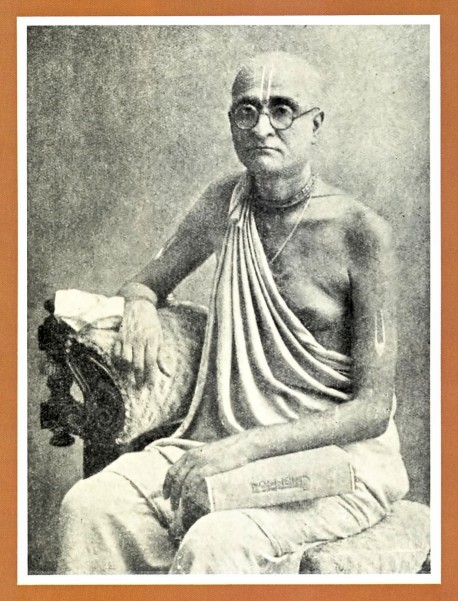
The following is the third of three articles depicting the pioneering efforts of Srila Bhaktivinoda Thakura, Srila Bhaktisiddhanta Sarasvati Gosvami, and those who have followed them in spreading the benediction of Krishna consciousness throughout the world.)
Instead of having his disciples retire to remote holy places, Bhaktisiddhanta sent them out to preach in the crowded cities, where the need was greatest. This required the introduction of some revolutionary practices, such as allowing his sannyasis, his disciples in the renounced order, to ride in automobiles. Until Bhaktisiddhanta’s time, holy men were restricted to walking or riding in animal-drawn carts; automobiles were too extravagant. But if the preaching of Lord Caitanya’s message could be furthered by using automobiles, why should they be rejected? Here was a practical application of Bhaktivinoda’s philosophy of renunciation, in which nothing was to be used for sense gratification but everything could be employed for Krishna’s service. Bhaktisiddhanta also allowed his sannyasis to wear sewn clothing. A sannyasi is discouraged from wearing sewn clothing, to prevent attachment to women, but this concession was made to enable his men to preach in respectable society in the big cities.
In 1933 Bhaktisiddhanta sent out several teams of preachers to London and Berlin. He even managed, with great difficulty, to send them money from India to finance their preaching. Bhaktisiddhanta was eager to fulfill Bhaktivinoda’s prophecy that Westerners would embrace Lord Caitanya’s movement. But he would not live to see it, for his disciples were unable to establish anything substantial in Europe. Even before leaving India on their mission, the sannyasis were doubtful about attracting Europeans to Krishna consciousness. After all, Europeans were inveterate meat-eaters, whereas they themselves were strict vegetarians. Yet Bhaktisiddhanta instructed that the mission of Lord Caitanya could be executed in all circumstances. Srila Bhaktisiddhanta, therefore, was an actual acarya. An acarya is “one who teaches by his example.” In this world there are many supposed teachers, but invariably their private lives are quite at variance with their teachings. Therefore a genuine acarya, or ideal teacher, cannot be adjudicated or selected. “Acarya” is not a material designation or title, like president, chairman or professor; an acarya must have spiritual qualifications. An actual acarya must be spiritually empowered by the previous acarya because of his total surrender to his spiritual master. This is illustrated in Bhagavad-gita: among many candidates, Arjuna alone received the ability to understand the mystery of God from Lord Sri Krishna—simply because he alone was Krishna’s unalloyed devotee and friend.
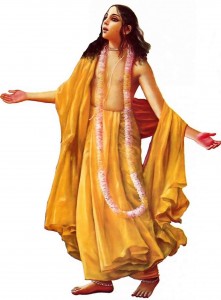
In 1936, Bhaktisiddhanta Sarasvati Thakura received a letter written by His Divine Grace A.C. Bhaktivedanta Swami Prabhupada, inquiring how he could be of service. Bhaktisiddhanta’s reply may be considered crucial to the mission of Lord Caitanya. Rather than suggest something new, Bhaktisiddhanta reiterated the order he had given to Bhaktivedanta Swami at their first meeting: “Preach the teachings of Lord Caitanya in English. You will be benefited, and everyone who hears you will be benefited.” Obviously this instruction, given first in 1922 and again after fourteen years, was very important.
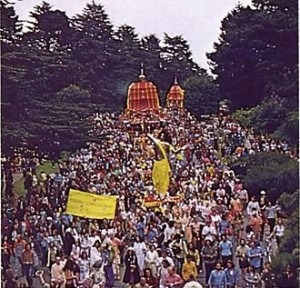
A fortnight later, Sri Srimad Bhaktisiddhanta Sarasvati Gosvami Maharaja Prabhupada departed from this earth. The stage had now been set for that great personage who would actually fulfill the prophecy of Bhaktivinoda Thakura by expanding the vigorous initial efforts of Bhaktisiddhanta Sarasvati and boldly preaching the teachings of Lord Caitanya all over the world.
The Pure Devotee
One of the signs of a great devotee, a maha-bhagavata, is that he is generally born into a family of devotees. Sukadeva Gosvami was such a maha-bhagavata, for his father was Srila Vyasadeva, the literary incarnation of Krishna who compiled all the Vedic literature. Another was Maharaja Pariksit, whose grandfather was Arjuna and whose grandmother was Subhadra, Lord Krishna’s sister. The great benefit for a child born in such a family is that he gets spiritual education right from birth. The early lives of great devotees are often similar. Just as Bhaktisiddhanta Sarasvati Thakura was trained from birth by Bhaktivinoda Thakura, Bhaktivedanta Swami was also fortunate to be trained in Krishna consciousness by his own father.
Even in childhood, Srila Prabhupada expressed the perfection of transcendental devotion. Like Maharaja Pariksit, he worshiped the Deities his father had given him. He simply imitated the worship of Radha-Govinda he used to see in the nearby family temple. (Those early Deities of Srila Prabhupada’s are still worshiped today by his sister in Calcutta.) As a child, Bhaktivedanta Swami would often spend his time studying the Indian Railways Timetable. He would see what trains were going from Calcutta to two other places: Vrndavana, the abode of Lord Krishna, and Puri, where Lord Caitanya Mahaprabhu had resided. After calculating the fares, he would then scheme up different ways of raising the money to go.
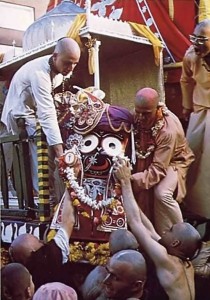
Even as a boy, Srila Prabhupada showed a proclivity for preaching. In Jagannatha Puri, India, there is a yearly festival called Rathayatra, in which the Deity of Lord Jagannatha (Krishna) goes on procession in a huge ratha, or float. So, with a miniature ratha, Srila Prabhupada would hold neighborhood processions, invite all his family members and friends and distribute lots of prasada. To this day Srila Prabhupada has instructed his disciples to do just what he was doing as a child—to worship Radha-Krishna Deities and stage Rathayatra festivals all over the world.
His Divine Grace dedicates his book Krishna, the Supreme Personality of Godhead, as follows: “To my father, Gour Mohan De (1849-1930, a pure devotee of Krishna who raised me as a Krishna conscious child from the very beginning of my life. In my boyhood ages he instructed me how to play the mrdanga [a drum for chanting Hare Krishna]. He gave me Radha-Krishna vigraha [Deities] to worship, and he gave me Jagannatha ratha to duly organize the festival as my childhood play. He was kind to me, and I imbibed from him the ideas later on solidified by my spiritual master, the eternal father.”
As a member of one of Calcutta’s aristocratic families, Srila Prabhupada was given the best education. He attended Scottish Churches College, run by British missionaries, where he studied economics, philosophy and history. As a follower of Gandhi’s non-cooperation movement, however, Srila Prabhupada refused to accept his university degree. He married in 1918. An astrologer foretold that Srila Prabhupada would in time become as wealthy as the wealthiest man in India. Soon afterward, though still a young man, he was selected to manage a well-known pharmaceutical laboratory.
The all-important meeting with Bhaktisiddhanta Sarasvati occurred in 1922. [For a description of that meeting, see Part 2 of this article, in Back to Godhead No. 68.] Srila Prabhupada has remarked that although others would ask many questions of the spiritual master simply to make an impression, he asked only one: “How may I serve you?” After that initial meeting, Srila Prabhupada spent several years developing his firm into a very successful business, but he never forgot Bhaktisiddhanta Sarasvati Thakura. He offered financial support to Bhaktisiddhanta’s Gaudiya Mission and introduced some of Bhaktisiddhanta’s sannyasis to his business associates. Srila Prabhupada would sometimes visit Bhaktisiddhanta’s mission and discuss devotional philosophy with his disciples, but when the devotees urged him to take initiation from Bhaktisiddhanta, Srila Prabhupada avoided it, admitting that he just liked to come and associate with the devotees. Bhaktisiddhanta was very pleased with this remark. Thus Srila Prabhupada never took a very active part in the activities of the Gaudiya Matha. At one point, the disciples, understanding Srila Prabhupada’s sincerity, encouraged him to become a full-time member and even to live with them, but then Bhaktisiddhanta prophetically declared that it would be better for Srila Prabhupada to remain apart. “One day he will join fully and do wonderful things,” Bhaktisiddhanta said. Then in 1933 in Allahabad, where Srila Prabhupada was living with his family, he became an initiated disciple of Sri Srimad Bhaktisiddhanta Sarasvati Gosvami Maharaja.
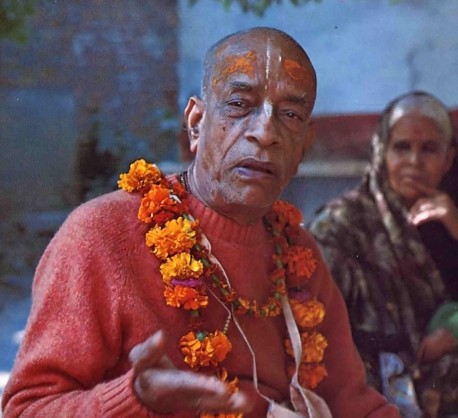
Following the Master’s Orders
In 1933 Srila Prabhupada delivered an address to a Gaudiya Matha convocation honoring the appearance day of Srila Bhaktisiddhanta Sarasvati Thakura. In that speech Srila Prabhupada explained the meaning of acarya, and he also expressed his deep devotion to his spiritual master as follows:
“Personally, I have no hope of having any direct service [to Krishna] for the coming crores of births of the sojourn of my life, but I am confident that some day or other I shall be delivered from the mire of delusion in which I am at present so deeply sunk. Therefore let me with all my earnestness pray at the lotus feet of my Divine Master to let me suffer the lot for which I am destined for all my past misdoings, but to let me have this power of recollection, realized through the unflinching mercy of my Divine Master, that I am nothing but a tiny servant of the Almighty Absolute Godhead. Let me therefore bow down at His lotus feet with all the humility at my command.”
In 1944, after Srila Bhaktisiddhanta’s demise, Srila Prabhupada pursued his spiritual master’s order by founding Back to Godhead, a fortnightly English paper that he himself wrote, edited and published. He was also its sole distributor. His Divine Grace preached actively, using his home for frequent small functions consisting of congregational chanting and authoritative discourses from the Vedic scriptures. But Srila Prabhupada’s wife was of a different bent. She did not like these meetings and even prevented her husband from instructing their children in devotional principles. Then came some unavoidable business reverses, and so finally in 1959 Srila Prabhupada took sannyasa (the renounced order of life) from one of his sannyasi Godbrothers and left home. He went to the holy village of Vrndavana, fulfilling his childhood desire. There he commenced writing and publishing several important books, in preparation for his voyage to America in 1965, which was to be the fulfillment of his spiritual master’s order. [For a background description of Srila Prabhupada’s writing and his work in Vrndavana, see “The Books of His Divine Grace A.C. Bhaktivedanta Swami Prabhupada,” in Back to Godhead No. 52, by the author of this article.]
Pointing Out What America Had Missed
Once in America, Srila Prabhupada indefatigably preached the teachings of Lord Caitanya. This was, of course, the first time that we Americans had ever heard of Lord Caitanya Mahaprabhu. I will always remember the way Srila Prabhupada would look at a picture of Lord Caitanya he had brought with him from Vrndavana. He had it high on the wall opposite his sitting place in his tiny New York apartment, and as he would unfold the glorious teachings of Lord Caitanya, he would regard that picture with an expression of deep transcendental love. It was that sublime feature of Srila Prabhupada’s that inspired me to broaden my understanding of Mahaprabhu’s teachings.
Coming from the East at the age of 70, Srila Prabhupada had a great deal to say to us space-age Americans. He spoke the truth. For example, here is what he wrote in his introduction to The Nectar of Devotion:
“As far as material necessities are concerned, the human civilization at the present moment is very much advanced in living comfortably, but still we are not happy because we are missing the point. The material comforts of life alone are not sufficient to make us happy. The vivid example is America: the richest nation of the world, having all facilities for material comfort, is producing a class of men completely confused and frustrated in life. I am appealing herewith to such confused men to learn the art of devotional service as directed in The Nectar of Devotion, and I am sure that the fire of material existence burning within their hearts will be immediately extinguished. The root cause of our dissatisfaction is that our dormant loving propensity has not been fulfilled despite our great advancement in the materialistic way of life. The Nectar of Devotion will give us practical hints how we can live in this material world perfectly engaged in devotional service and thus fulfill all our desires in this life and the next. The Nectar of Devotion is not presented to condemn any way of materialistic life, but the attempt is to give information to religionists, philosophers and people in general how to love Krishna. One may live without material discomfiture, but at the same time he should learn the art of loving Krishna. At the present moment we are inventing so many ways to utilize our propensity to love, but factually we are missing the real point, Krishna. We are watering all parts of the tree but missing the tree’s root. We are trying to keep our body fit by all means, but we are neglecting to supply foodstuffs to the stomach. Missing Krishna means missing one’s self also. Real self-realization and realization of Krishna go together simultaneously. For example, seeing oneself in the morning means seeing the sunrise also; without seeing the sunshine no one can see himself. Similarly, unless one has realized Krishna there is no question of self-realization.”
Challenging the Bogi Yogis
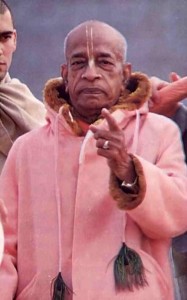
Srila Prabhupada was a blunt critic. His targets were all the things sacrosanct to us young American materialists: sense gratification, mental speculation, sex, meat-eating, skyscrapers, fast cars, the United Nations, nationalism, science, space exploration, family and love, impersonal spirituality and other gurus, He was against the entire modern civilization. He even discouraged us from eating in restaurants. One thing difficult for us to accept in the beginning was his unreserved criticism of other gurus. As student-aged youths, we were skeptical of those who claimed to monopolize anything, what to speak of the truth. We were tired of those who said that theirs was the only way. Our idea for eliminating all the hatred in the world was simply to accept everything as good. Let everyone do his own thing, we thought; you can follow or not, but you should not criticize, especially in spiritual matters. Srila Prabhupada swept away all this. He showed us how to discriminate sensibly between true and false spirituality. Like Bhaktivinoda Thakura, who had courageously defeated a yogi imposter who was imitating Krishna, Srila Prabhupada would not let us be misguided by the “bogi yogis,” as he called them. To this day Srila Prabhupada has continued to chide so-called gurus who mislead their followers from the path of devotional service to Krishna, or God. Here is a recent article from Time (Feb. 11, 1974):
“Trouble is stirring in Nirvana. A.C. Bhaktivedanta Swami of the Hare Krishna movement, at a news conference in Hong Kong last week, denounced a rival guru: self-styled divinity Maharaj Ji, 16, now counseling his disciples in California. The ascetic Swami, whose followers constitute a kind of saffron-robed Hindu version of the Salvation Army, began by saying, ‘You’ve got to decide whether he is God, or a dog.’ Noting the young leader’s luxurious life style, the Swami declared rather ominously, ‘He is cheating people, but he will be cheated in a bigger way. When God meets cheats, he can be a better cheat than they.’ “
Srila Prabhupada did not come to America as a beggar. “I have come to teach you what you have forgotten,” he told reporters. “It is love of God.” He chose America of all places in the West because the entire world is following her example of economic development. If he could succeed in making Americans take up spiritual life, then the rest of the world would follow. This was his master plan for fulfilling his spiritual master’s order.
The Hare Krishna Explosion
Seeing the potential for spreading Vedic culture in America, Srila Prabhupada requested his Godbrothers in India to help him. But they were not interested, so Srila Prabhupada founded his own society in July of 1966. He called it the International Society for Krishna Consciousness, or ISKCON. There was some discussion among his first students that “Krishna” was too sectarian a name for the title of the Society—”the International Society for God Consciousness” would be more readily acceptable. But Prabhupada wanted Krishna’s name. “‘God is the position, but God has a name, and His name is Krishna. We know who God is, so we want to call Him by His name,” he explained.
After opening the first ISKCON center, in New York, Srila Prabhupada was invited by some students to come to the West Coast. He entrusted the responsibility for publishing Back to Godhead to his disciples, a number of whom he had trained to go preach the teachings of Lord Caitanya themselves and establish centers. These early disciples were not very adept in quoting Sanskrit, nor in the procedures of Deity worship, nor even in following all the practices of devotional life—but they were convinced. They opened several more centers—in San Francisco, Los Angeles and Seattle; then in Montreal and Vancouver; and soon in Buffalo, Washington, D.C., and Boston.
Then Srila Prabhupada sent a group of disciples to London. Whereas the advanced Indian sannyasis sent by Bhaktisiddhanta Sarasvati Thakura were unable to accomplish anything in London for years, three American householder couples soon opened a thriving Krishna consciousness center in the heart of downtown London. It has since expanded to include a temple and asrama on a stately seventeen-acre manor just outside the city. With the world-famous musician George Harrison, the English disciples have recorded several records of Hare Krishna that have become hits all over Europe and even in Japan, and that have financed the publication of one of Srila Prabhupada’s books. No wonder Srila Prabhupada proudly declared that these householders were far greater than many big sannyasis.
Srila Prabhupada’s disciples have now opened almost fifty centers in America, and another fifty in half a dozen European countries, as well as Australia, New Zealand, Hong Kong, the Philippines, Japan, Africa and South America. In these centers, Radha-Krishna Deities are very opulently worshiped, and there are feasts and Rathayatra festivals, with as many as 25,000 people attending. There are also classes for the public and all-important book distribution. This has all been accomplished solely by the effort of Srila Prabhupada, who maintains close contact with the administrators of all his temples. He writes up to twenty-five letters daily, both to give spiritual guidance and to see to the Society’s management. In 1970 Srila Prabhupada formed amongst his senior disciples a Governing Body Commission (GBC), consisting of twelve zonal secretaries to administer Krishna conscious affairs in twelve different sections of the world and to cooperate in spreading the teachings of Lord Caitanya Mahaprabhu. This is exactly how Bhaktisiddhanta Sarasvati, who coined the title GBC, wanted his Gaudiya Matha administered after his departure.
Innovations by a Dynamic Acarya
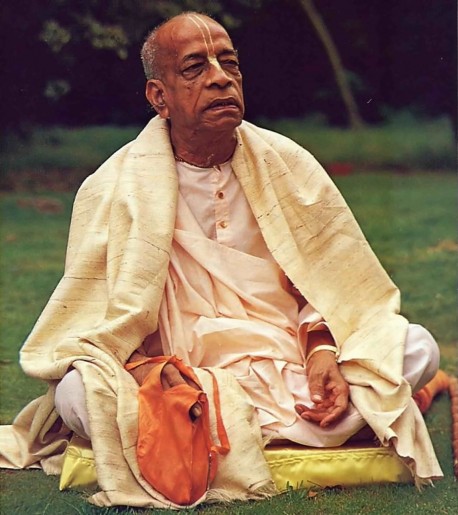
Not only do Srila Prabhupada’s Godbrothers refuse to help Srila Prabhupada spread the teachings of Lord Caitanya, but they unfortunately criticize his accomplishments. In the very beginning they wrote from India that it simply wasn’t possible to make devotees out of mlecchas (heathens who do not follow the four Vedic prohibitions against meat-eating, illicit sex, gambling and intoxication). Their conclusion was exactly opposite to the teachings of Lord Caitanya and the historic mission of Bhaktivinoda Thakura and Bhaktisiddhanta Sarasvati Thakura. Thus Srila Prabhupada found himself having to preach the teachings of Lord Caitanya to his own Godbrothers, as if they were the same caste conscious brahmanas who have continuously opposed Lord Caitanya’s mission.
They criticized Srila Prabhupada’s being addressed as “Prabhupada.” They maintained that only Bhaktisiddhanta Sarasvati deserved to have that title and that His Divine Grace A.C. Bhaktivedanta Swami Prabhupada was being disrespectful by proclaiming himself Prabhupada. Actually, however, the term “Prabhupada” came to be used because some of Prabhupada’s disciples wanted to address their beloved spiritual master with a term more respectful than “Swamiji” or “Guruji,” which are used to address an ordinary sannyasi. Then an article appeared in an early Back to Godhead to settle the matter: “PRABHUPADA. The word Prabhupada is a term of the utmost reverence in Vedic religious circles, and it signifies a great saint even among saints. The word actually has two meanings: first, one at whose feet (pada) there are many prabhus (a term meaning ‘master,’ which the disciples of a guru use in addressing each other). The second meaning is one who is always found at the lotus feet of Krishna (the supreme master).
“In the line of disciplic succession through which Krishna consciousness is conveyed to mankind, there have been a number of figures of such spiritual importance as to be called Prabhupada. Srila Rupa Gosvami Prabhupada executed the will of his master, Sri Caitanya Mahaprabhu, and therefore he and his associate Gosvamis are called Prabhupada. Srila Bhaktisiddhanta Sarasvati Gosvami Thakura executed the will of Srila Bhaktivinoda Thakura, and therefore he is also addressed as Prabhupada. Our Spiritual Master, Om Visnupada 108 Sri Srimad Bhaktivedanta Swami Maharaja, has, in the same way, executed the will of Srila Bhaktisiddhanta Sarasvati Gosvami Prabhupada in carrying the message of love of Krishna to the Western world, and therefore we American and European humble servants of His Divine Grace, from all the different centers of the sankirtana movement, have followed in the footsteps of Srila Rupa Gosvami Prabhupada, and prefer to address His Grace our Spiritual Master as Prabhupada, and he has kindly said ‘Yes.’ “
Next, the Godbrothers audaciously claimed that Srila Prabhupada was mixing boys and girls together, especially on the chanting and preaching parties. Vedic culture rigidly controls the relations between men and women. If a girl even goes out of home alone at night, she is immediately rejected by her family members. A sannyasi cannot even speak to a woman in a secluded place nor be alone with even his mother or sister. Lord Caitanya would not allow a woman to come near Him, even to offer obeisances, nor would He allow Himself to hear the female temple attendants (dasis) singing religious songs. However, what Srila Prabhupada found when he came to the U.S.A. was quite a different style of life. Co-ed dormitories, legalized abortions and free distribution of contraceptives are all part of the modern permissiveness of Western materialistic civilization. Understandably, Srila Prabhupada thought that as soon as he would introduce the four prohibitions, all the early students would go away. Americans were too accustomed to unrestricted mixing of the sexes for them all to become sannyasis (lifelong celibates) and to follow all strictures. Srila Prabhupada thought it better for their spiritual life for them to marry and restrict themselves to one husband or wife. But who would arrange for them to marry? Being a sannyasi himself, Srila Prabhupada was forbidden to have anything to do with household life. But he was alone in America, so he overstepped the rule and personally performed the marriage ceremonies for his students according to Vedic rites. (Now that disciples are qualified, all marriages are performed by ISKCON’s temple presidents.)
Srila Prabhupada modified other devotional practices to introduce the teachings of Lord Caitanya abroad. For instance, he has set the minimum number of “rounds” to be chanted on the meditation beads at sixteen (approximately two hours of time) rather than the sixty-four rounds Srila Bhaktisiddhanta Sarasvati had set for his disciples. This is because Americans are generally not inclined to lengthy periods of meditation. This genius for adopting new ways to extend the teachings of Lord Caitanya is the very qualification of a real acarya. Caitanya-caritamrta describes how Lord Caitanya devised many methods and even tricks, in particular His sannyasa, just to get all opposition to become Krishna conscious. An acarya does not follow hackneyed methods; he introduces dynamic ways to preach Krishna consciousness. Unfortunately, however, those who do not have the conviction or spiritual potency to spread the teachings of Lord Caitanya beyond their dutiful circle of pious widows just plod along in the same stereotyped way and jealously criticize the real achievement.
The Great Personality
Innovation by an acarya does not adulterate the teachings of Lord Caitanya. The goal remains the same, but only the means are modified to suit the time, place and circumstances. This enthusiasm for preaching is the very essence of the teachings of Lord Caitanya Mahaprabhu, who Himself even preached to the animals in the forests. Srila Prabhupada’s success in doing what no other spiritual master has ever done is simply due to his unflinching dependence on Lord Krishna and the previous acaryas. The evidence is found on page after page of Srila Prabhupada’s books. For example, he writes in his preface to Bhagavad-gita As It Is:
“Our Krishna consciousness movement is genuine, historically authorized, natural and transcendental due to its being based on Bhagavad-gita As It Is. It is gradually becoming the most popular movement in the entire world, especially amongst the younger generation. It is becoming more and more interesting to the older generation also. Older gentlemen are becoming interested, so much so that the fathers and grandfathers of my disciples are encouraging us by becoming life members of our great society, the International Society for Krishna Consciousness. In Los Angeles many fathers and mothers used to come to see me to express their feelings of gratitude for my leading the Krishna consciousness movement throughout the entire world. Some of them said that it is greatly fortunate for the Americans that I have started the Krishna consciousness movement in America. But actually the original father of this movement is Lord Krishna Himself, since it was started a very long time ago but is coming down to human society by disciplic succession. If I have any credit in this connection, it does not belong to me personally, but it is due to my eternal spiritual master, His Divine Grace Om Visnupada Paramahamsa Parivrajakacarya 108 Sri Srimad Bhaktisiddhanta Sarasvati Gosvami Maharaja Prabhupada.”
Now Srila Prabhupada has brought many of his disciples to India so that his Godbrothers can see the results of his preaching for themselves, and a few of them are beginning to recognize that he is actually the successor to Bhaktisiddhanta Sarasvati Thakura.
While this article was first being written, preparations for the first great Mayapur pilgrimage were in full swing. On land purchased at the birthsite of Caitanya Mahaprabhu, Srila Prabhupada has initiated a project to build the tallest and most majestic temple in India, as well as a Vedic University for students from all over the world. Already one building has been completed. For this year’s festival, devotees from ISKCON centers throughout the world will have gathered for nine days of chanting, processions, lectures, films, exhibitions, organizational meetings and prasada feasting, as well as the bliss of associating with their beloved spiritual master and each other. Lord Krishna says in Bhagavad-gita that His devotees like very much to be together.
mac-citta mad-gata-prana
bodhayantah parasparam
kathayantas ca mam nityam
tusyanti ca ramanti ca
“The thoughts of My pure devotees dwell in Me, their lives are surrendered to Me, and they derive great satisfaction and bliss enlightening one another and conversing about Me.” (Bg. 10.9)
It cannot be disputed that the great personality predicted by Srila Bhaktivinoda Thakura is none other than His Divine Grace A.C. Bhaktivedanta Swami Prabhupada. He has traveled and preached around the world almost 10 times, he has opened centers in America, Europe, South America, India, the Far East, Australia and also Africa, and he has written a score of best-selling books on the teachings of Lord Caitanya. It is quite understandable why Srila Prabhupada dedicates one of those books (aptly entitled Teachings of Lord Caitanya) as follows:
DEDICATED TO
The Sacred Service
of
SRILA SACCIDANANDA
BHAKTIVINODA THAKURA
Who Initiated The Teachings of Lord Caitanya
in
The Western World
(McGill University, Canada)
in 1896
The Year Of My Birth
The Legion of Pure Devotees
Bhaktivinoda’s philosophy of using material things in the loving service of God has been fully implemented by Srila Prabhupada. He purposely came to America because America has more at its disposal than any other country in the world. Instead of wasting time and money going to the moon to collect rocks, that same organizing talent can be used to send souls back home, back to Godhead. Whereas Bhaktisiddhanta Sarasvati first used automobiles and printing presses, his foremost disciple has enlisted Americans to use their boundless wealth and technology to spread the teachings of Lord Caitanya, thus fulfilling the 89-year-old prophecy of Bhaktivinoda Thakura. Now, for the first time, the world is so eager for the teachings of Lord Caitanya that Srila Prabhupada’s foreign students are building a memorial to Lord Caitanya at His birthsite. The effect on native Indians has been a revival of interest in their own Vedic culture. India will only be respected by the rest of the world if it spreads this spiritual culture. If India neglects this responsibility and tries only to mimic Western materialism, India will be an inveterate beggar nation. Thus, Srila Prabhupada should be recognized as his country’s foremost ambassador.
Srila Prabhupada is the successor in the disciplic line from Bhaktisiddhanta Sarasvati Thakura because he has dedicated his entire life to fulfilling his spiritual master’s command. He has raised the most unqualified candidates to a position higher than those born in the families of brahmanas. To be able to follow and learn from such a rare transcendental personality is an invaluable opportunity. Disciples from all over the world, therefore, repeatedly offer their obeisances to His Divine Grace as follows:
nama om visnu-padaya
Krishna-presthaya bhu-tale
srimate bhaktivedanta-
svamin iti namine
“I offer my humble obeisances to His Divine Grace A.C. Bhaktivedanta Swami Prabhupada, who is the most dear to Lord Krishna on this earth because he has taken complete shelter at the Lord’s lotus feet.”
Then they offer their obeisances with another, even more telling verse.
namas te sarasvate deve
gaura-vani-pracarine
nirvisesa-sunyavadi-
pascatya-desa-tarine
“I offer my humble obeisances to you, O spiritual master, servant of Bhaktisiddhanta Sarasvati. You are kindly preaching the message of Lord Caitanya and delivering the Western countries, which are filled with impersonalism and voidism. “
The opportunity is now presented to everyone, whether an ordinary karmi or a learned sannyasi, a brahmana or a sudra, American or Indian, to stand up and be counted in the Lord’s legion of pure devotees, with Srila Prabhupada as the commander-in-chief. Let us give up all hesitation, discard impure sectarian designations and surrender ourselves at the lotus feet of the Lord’s pure representative. As the great sages of Naimisaranya prayed to their spiritual master, Sukadeva Gosvami, let us also pray: “We think that we have met Your Grace by the will of providence, and thus we accept you as the captain of the ship for those who desire to cross the dangerous ocean of Kali [the modern age of materialism], which destroys all the good qualities of a human being.” (Srimad-Bhagavatam, 1.1.22) Who among us is so foolish as to hesitate needlessly and thus risk missing the boat of transcendental perfection, Krishna consciousness?

Leave a Reply